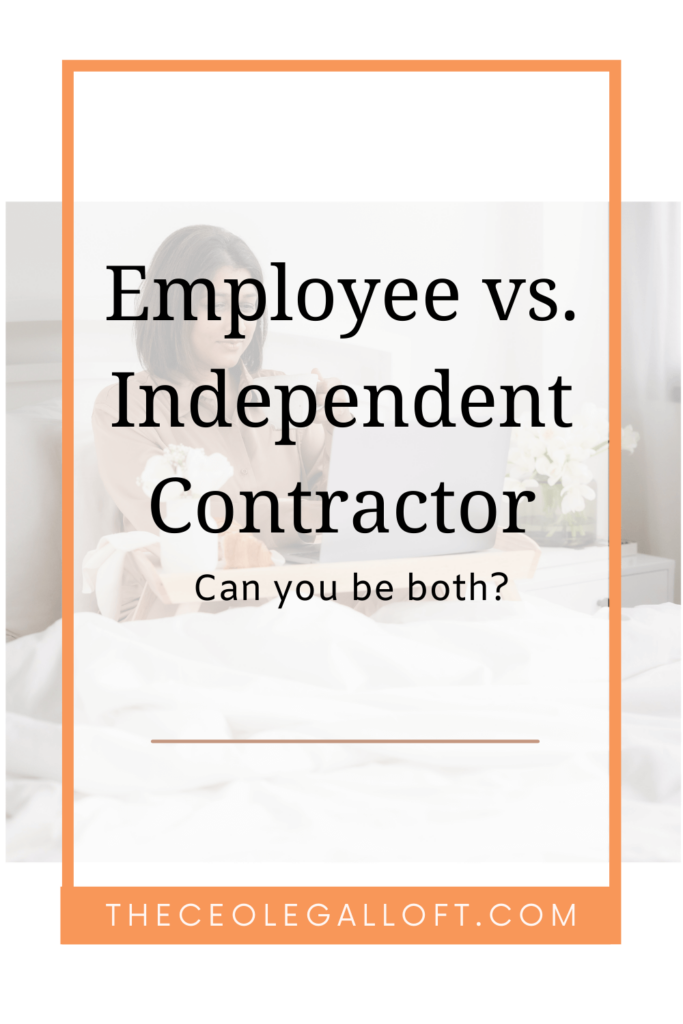Generally, an employee cannot be an independent contractor and vice versa. As everything with the law, there are exceptions.
Can you be both a 1099 and W-2 employee?
According to the IRS, if an employee is doing the type of work that is unrelated to their regular job tasks for the same company, they could be both a W-2 employee and independent contractor. For example, if you are employed as a copywriter for Target, but you also do event planning on the side. If Target hires your event planning company to plan their office party, then the wages Target paid you are classified as an independent contractor and they would issue you a 1099.
Many businesses face the question of whether to hire an employee or independent contractor. It’s not easy to tell the difference between an employee and an independent contractor relationship, and the consequences can be dramatic. A misclassified employee can get your company into a lot of trouble, particularly in terms of compensation, taxes, and liability.

Independent contractors are generally in business for themselves.
If you use independent contractors, it means you’re not paying them any benefits as employees. Independent contractors run their own business and don’t receive benefits like health insurance, workers’ compensation or unemployment insurance from a single employer. Independent contractor insurance protects you in the event that you’re injured on the job or if you’re sued by a client or customer.
There are several types of independent contractor insurance, including:
- General Liability Insurance: This policy helps pay for legal fees if someone sues you for bodily injury or property damage to others. It also can cover medical expenses for people injured on your property.
- Professional Liability Insurance: This policy is also known as errors and omissions (E&O) insurance and malpractice insurance. It covers professional mistakes made on the job, such as incorrect advice that leads to financial loss for clients. This isn’t required by law, but it’s important if you provide an expert service like financial planning or accounting service
Independent contractors are paid by the job and are not entitled to a minimum wage or overtime pay.
Unlike an employee, an independent contractor does not work regularly for an employer but works as and when required, during which time he or she may be subject to law of agency.
Independent contractors are usually paid on a freelance basis. Contracts are usually written and state that the independent contractor has been hired as an independent business, with no employment relationship intended. The key factor in determining whether a worker is an employee or an independent contractor is the amount of control the principal has over the worker.
Independent contractors are responsible for their own taxes.
In most cases, independent contractors do not have income taxes withheld by their client and pay their taxes by filing Form 1040, Schedule C with their annual federal tax return, Schedule SE to calculate the self-employment tax, and Form 1040-ES to pay estimated taxes throughout the year.
Many times when you first start working as a contractor, the client may ask you to fill out a form W9, Request for Taxpayer Identification Number and Certification. Then if you earn more than $600 from a client, they should send you a Form 1099-MISC (not a W-2) at the beginning of the next year detailing how much they paid you during the previous year.

What happens if a worker is misclassified?
Employers who provide misclassified workers with employee benefits such as insurance or a 401(k) plan may be subject to penalties and fines. When you hire an employee, it’s your responsibility to follow the federal law and rules and regulations of the IRS. If you misclassify workers with employee benefits, such as unemployment benefits, insurance, or a 401(k) plan, you may be subject to penalties and fines. The burden is on you to determine who qualifies as a contractor or an employee.
To prevent having to pay fines and back taxes, there’s IRS guidelines that help determine if a worker is an employee or independent contractor. The degree of control is an important factor when determining the worker’s status. Below are some of the key factors:
- Financial control: An employee usually receives standard compensation, while independent contractors are paid on commission or by the job (they’re also typically not reimbursed for business expenses).
- Behavioral control: Employees are trained on how to perform their jobs, while independent contractors are expected to have their own processes in place and can determine their hours of work. Typically, an independent contractor doesn’t have to perform tasks on the employer’s premises (unless the job entails it).
- Relationship between the parties: Employee relationships are typically long term, while independent contractors tend to have short-term relationships with clients.
Why Does it Matter if I am Misclassified?
In addition to tax penalties, employers that misclassify workers could also face audits by state agencies and potential claims by the workers.
If you are found to have misclassified workers, you’ll face audits and potential lawsuits from your state’s labor department, the IRS and the U.S. Department of Labor (DOL).
You may also be liable for significant penalties and back taxes, including:
- Unemployment taxes on wages paid to the employee during the past three years
- Back Social Security taxes and Medicare taxes, plus interest charges and penalties
- Federal income tax withholding that should have been done on wages paid to the employee during the past three years, plus interest and penalties
- State income tax withholding that should have been done on wages paid to the employee during the past three years, plus interest and penalties
- Failure to pay payroll taxes on income earned by an independent contractor will result in a 100 percent penalty. In addition, if you intentionally misclassify your worker as an independent contractor in order to avoid paying employment taxes, you could face additional civil penalties of up to $1,000 per worker per year and 1 year in prison that can also be imposed.
What Can I Do if I’ve Been Misclassified?
If you believe that you have been misclassified as an employee, there are a few things that you can do in order to try and rectify the situation. The first step is to speak with your employer and explain your concerns. If your employer is unwilling to listen or make changes, you can file a complaint with the Department of Labor or your state’s labor board. You may also want to consult with an attorney to see if you have any legal recourse.
It is important to remember that misclassification is a serious issue and it can have major implications for your rights as an employee. If you believe that you have been misclassified, take action and do not hesitate to reach out for help if needed.
Takeaway: You need to make sure that if you hire an independent contractor, you’re seen as hiring someone who isn’t an employee.
Employee or independent contractor? Determining the status of a worker is not just a matter of semantics. If you’re a worker and unsure of your status with a company, you can ask the IRS to help by filling out the form SS-8.
Independent contractor misclassification costs business owners thousands of dollars in taxes because there are huge differences between the two—and it’s important for all parties to be clear on employment status. So don’t fall into that trap, and make sure you know what you are before the IRS investigates themselves.

We’ve drafted an independent contractor agreement, a written agreement that defines the business relationship between your company and your independent contractor or service provider.

+ show Comments
- Hide Comments
add a comment